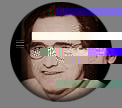|
|
MANUEL DE DIOS UNANUE
Manuel
De Dios Unanue's commitment to seeking and printing the truth at
any cost eventually cost him his life, and cemented his heroic legacy
in the minds of New York Latinos and journalists.
De Dios, former editor-in-chief of New York's largest Spanish-language
newspaper, El Diario-La Prensa, was murdered on March 11,
1992 by a member of a Colombian drug cartel that he had attacked
in print.
"The slogan of [El Diario-La Prensa] is 'El campeon de los
hispanos,' the champion of the people-he did that," said El Diario-La
Prensa reporter Rossana Rosado in a September 28, 1999 New York
Times article.
"There were drug traffickers in the community," Rosado said. "He
set up hot lines for people to call us and tell where they were,
then he'd publish pictures of the corners they worked. When the
photographer complained it was dangerous, he'd say, 'You want to
be safe, go work in a bank.'"
At de Dios' memorial service, Rosado focused her comments on de
Dios' heroism as a journalist. She said he continued to write articles
and a book on the drug trade, even though he knew the dangers he
faced.
"He
practiced journalism with the zest some people have for skydiving,
only he did it without a parachute," said Rosado in a March 19,
1992 Newsday article. "He did not do this for the glory;
he did this because he felt it was right."
In March 1994 Colombian assassin Mejia Valez was convicted of de
Dios' murder and sentenced to life in prison without parole. During
the testimony, Colombian drug lord Jose Santacruz Londono was implicated
in hiring Velez after becoming enraged with de Dios' articles about
the Cali cocaine cartel. At his sentencing, Judge Edward R. Korman
said that Velez had "not only snuffed out in cold blood the life
of another human being, he endangered the very rights that underlie
a free society."
De Dios became editor of El Diario-La Prensa in 1984. In
the next 5 years, he would be credited with uncovering numerous
stories of corruption and crime in New York City. The biggest story
of de Dios' career was investigating and debunking the Colombian
drug cartels. In 1988, he published a book, The Secrets of the Medellin
Cartel, on the internal workings of the organizations. He founded
two magazines: Cambio XXI ("Change in the 21st Century")
and Crimen ("Crime"). De Dios left El Diario-La Prensa
in 1989 to do a radio show called "What Others Silence" on a Spanish-language
station.
De Dios knew that writing was a risk for him. In one his El Diario-La
Prensa columns, he even predicted it would lead to his death:
"The day something happens to me, many will know who was responsible."
"In the end, he died the way many of us expected him to," said Albor
Ruiz, who worked for de Dios when he was editor of El Diario-La
Prensa. "He was always looking for the truth. And in his work,
it never crossed his mind to compromise."
De Dios was born into political turmoil and civil unrest. His father
and mother immigrated to Cuba after General Francisco Franco came
to power in Spain. The family returned to Spain during Fidel Castro's
revolution. In 1967, the family fled Spain again, settling in Puerto
Rico.
"Writing is what I've always wanted to do," said de Dios in a February
13, 1989 Newsday article. "When I was a child in Batista's
Cuba, I got together with some friends and we put out a newspaper
that we made by typing out sheets of paper and making carbon copies.
We did that until Castro took over. When I lived in Spain under
Franco, I was also a writer. No one will ever be able to tell me
that I can't write."
Richard Araujo, an editor at El Diario, said de Dios had
mentioned to friends that he had received death threats over the
phone warning him against writing about Griselda Blanco, a major
cocaine dealer in Queens in the 1970s.
De Dios refused to be intimidated. In the first issue of Crimen,
he called Blanco "The Queen of Cocaine in Queens." "He wouldn't
get scared," said Araujo in a March 13, 1992 Newsday article.
"His usual response would be, 'You know where to find me.'"
A month before his murder, de Dios testified in Puerto Rico at the
controversial Cerro Maravilla hearings, the case often called Puerto
Rico's Watergate. "He was loyal to his principles, his convictions,
his family and his country," said Puerto Rican Senate Judiciary
Committee Chairman Senator Marco Rigau at de Dios' funeral service.
"He was more than a victim, he was a hero."
|


